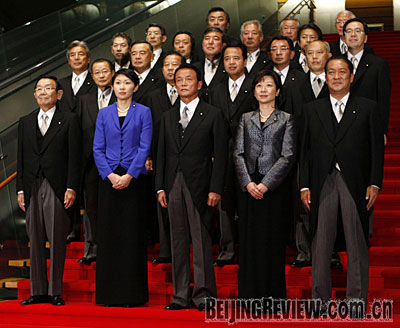|

NEW CABINET: Japanese Prime Minister Taro Aso (front row center) and his cabinet members pose for a photo after assuming their posts on September 25 in Tokyo. Four days later, newly appointed Transport Minister Nariaki Nakayama resigned due to verbal blunders (XINHUA/REUTERS)
With the parliamentary election expected as early as November 2, the Aso cabinet may not have enough time to perform efficient administration. The government thus will mainly focus on solving big problems involving the national economy and people's livelihoods, which voters care about most.
Topping the new government's agenda is a supplementary budget. As the international economic environment worsens and liquidity shortages appear, it is important to revive anemic Japanese enterprises, especially small and medium-sized ones, to avoid a further economic slide.
Next is to mend and strengthen Japan's social security system and solve key problems with cost burdens and profit allocation. The government needs to put forward practical and viable reformation plans. Moreover, it has to reverse the damage caused by the recent poison rice scandal to restore consumers' trust and sense of security.
Because of shortages of time and power, the government may not be able to avoid making empty promises to please voters. The election results will prove whether voters take Aso at his word. The next few weeks might see reorganization both within and between parties adjusting to a shifting political landscape. Fukuda's resignation and Aso's coming into power just started a new political chess game, whose coming moves might be even more fascinating.
Aso's foreign policy
The new government faces the same time crunch in diplomatic fields. Especially when dealing with Europe and the United States, Aso will basically extend current foreign policy because Japan's national interests do not change much.
The Sino-Japanese relationship will be in the spotlight as well. It is natural that the changed political situation in Japan will influence the development of bilateral relations. Since Hirofumi Nakasone, the new Foreign Affairs Minister, has limited diplomatic experience, Aso himself will play a guiding role in foreign affairs. Based on his tough remarks in the past, critics believe Aso will take a harder stance on China than his predecessor.
Due to his clear political stance and strong nationalism, Aso is categorized as a hawk. During his term as foreign minister, Aso promoted value-oriented diplomacy-emphasizing democracy, freedom, human rights, the rule of law and the market economy-and an "arc of freedom and prosperity" overlaying the "emerging democracies" on the outer rim of the Eurasian continent. But actions do not always match words. Analyzing Aso's political history and the way he chose his cabinet, Aso is unlikely to be the "wheeler-dealer" type or cling to his beliefs above all else like the right wing does. Rationality and practicality will be the cornerstones of the new government when dealing with foreign relations, especially the Sino-Japanese relationship. Therefore, it is not necessary to be overly pessimistic about Aso's China policy.
Besides, the Aso administration's primary mission is to win a decisive victory in the upcoming election to change its lame duck status in the parliament. This is the only way the cabinet can become a long-term authority instead of a transitional one. As the Aso cabinet must concentrate on the election campaign and domestic issues, it can hardly spare much passion on altering Japan's China policy. Maintaining stable development of foreign relations, including the relationship with China, is the wisest choice Aso can make.
In fact, this cabinet is quite lucky to inherit good Sino-Japanese relations, as the two countries established a strategic and mutually beneficial relationship during Fukuda's administration. Now the test will be what the Aso government does with that legacy, and how it will enrich the bilateral relationship to create a win-win situation for China and Japan and promote the long-term development of regional cooperation.
The author is an associate researcher with the China Institute of International Studies | 